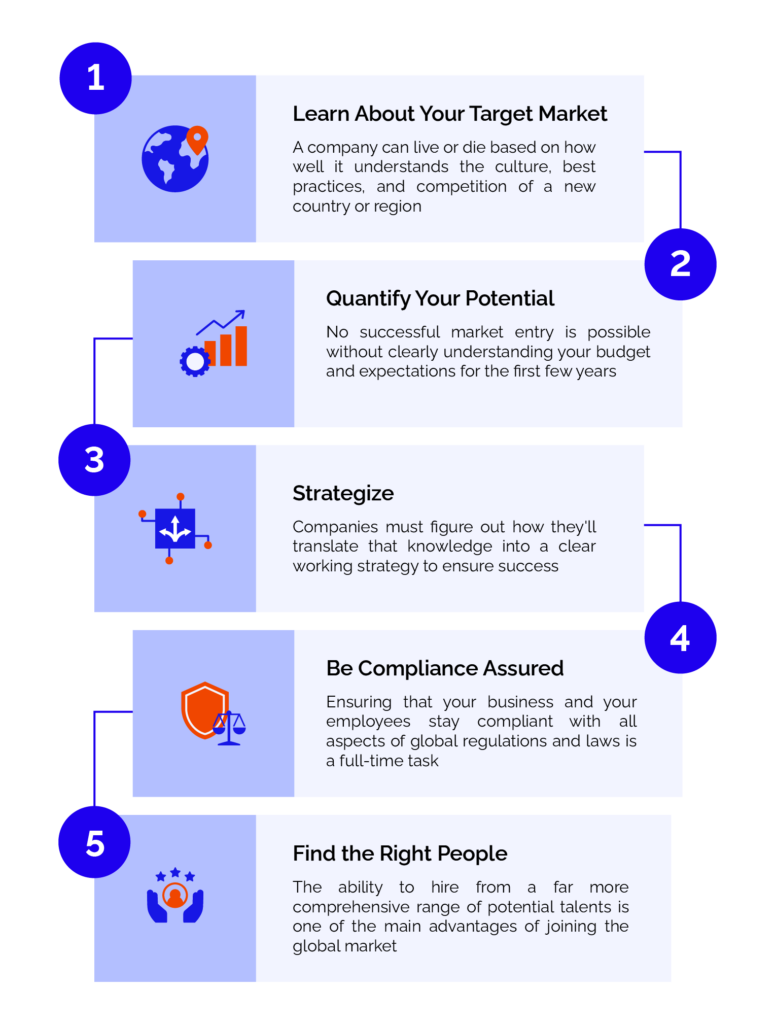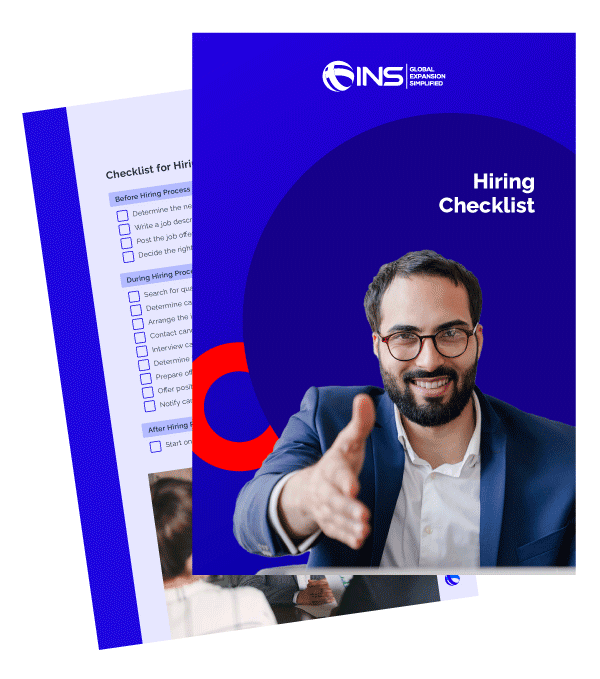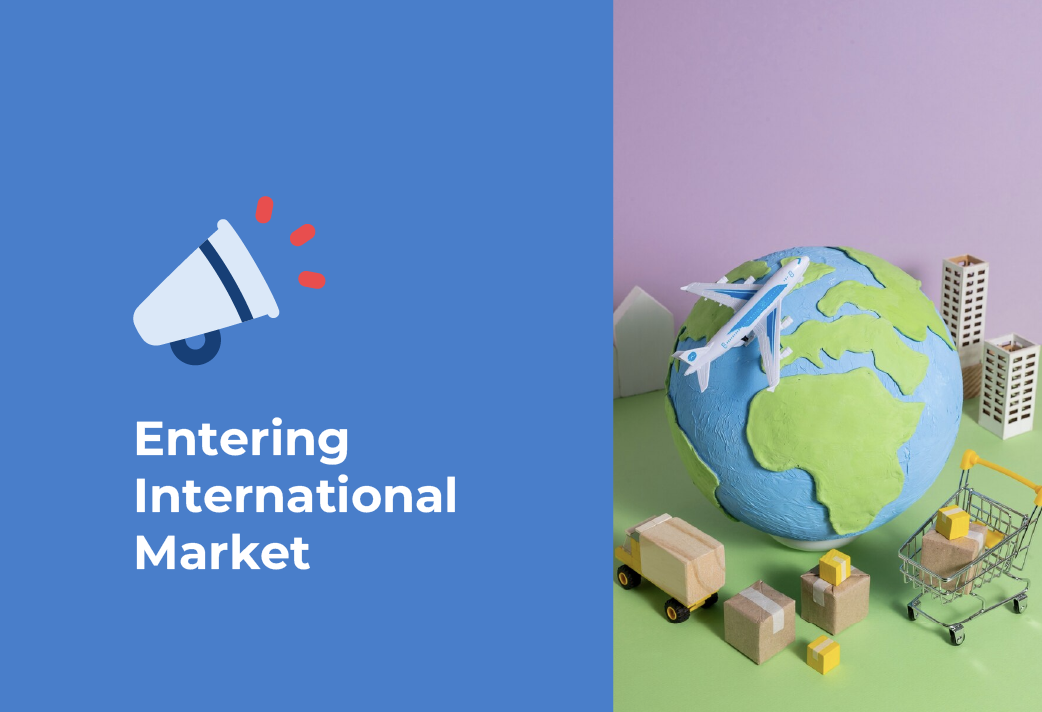Bringing your business into the global market may seem like the fast track to success. It can mean expansive new markets, new talent options, and unlimited potential partners. However, problems inherent in entering an international market can damage companies if they aren’t ready.
Suppose you want to enter foreign markets and expand overseas. In that case, you will have to be sure that your product and your company can handle the differences. It helps to consider culture, business processes, labor law, and anything else that could be unfamiliar.
Here, we’ve put together a primer of the 5 essential steps for entering an international market so that you can step out with your best foot forward.

Tired of scrolling? Download a PDF version for easier offline reading and sharing with coworkers
In a hurry? Save this article as a PDF
Tired of scrolling? Download a PDF version for easier offline reading and sharing with coworkers.
Fill up the form below 👇🏼

Our Global Market Entry Steps
Learn About Your Target Market
It may seem obvious, but small details can affect the success of a product or service in a new target market. A company can fail based on how well it understands the culture, best practices, and competition of a new country or region.
When entering an overseas market, market research takes on a new level of importance. This can involve elementary things. For example, how can you redefine yourself for a specific market with an established competitor?
A great example of this kind of local awareness is Coca-Cola. Initially, they used a series of Chinese characters with the right sound, “Ke-Kou-Ke-Le”. However, they failed to consider the Chinese language’s intricacies and called their product “bite the wax tadpole”.
This meant a tough market entry until they redesigned their local brand. Eventually they used the characters meaning “happiness in the mouth” and remain popular in China today.
Quantify Your Potential
No successful market entry is possible without knowledge of your budget and initial expectations. Entering an overseas comes with new problem aspects, namely currency, local business trends, and global economic shifts.
Companies looking to do business in the global market will have to ensure that they can maintain business in many currencies. This is due to the strict requirements regarding local payroll taxes when operating in a foreign currency.
When thinking about operating overseas, companies are vulnerable to completely new local business trends. Similarly, broader global trends will affect operations at multiple points in a service process.
One particularly timely example of this is how different countries respond to remote work. According to studies, workers in France are far less likely to be experienced in or currently working remotely (29%). This is much lower than in Germany, where more than half (51%) of the workforce already works remotely.
These differences will affect how your company operates in a new country, such as prioritizing office space in a budget.
Strategize for A Specific Market
Once an understanding of the local market is achievable, companies must figure out how to translate that knowledge into a clear working strategy for success. This may mean hiring local experts who can guide a company through local specific marketing trends, budgeting requirements, and service needs.
Companies who enter a new overseas market with a well-made market entry strategy are more likely to avoid mistakes and delays that can cripple a smaller business. Expanding overseas is no small demand. It can have serious implications for the permanent establishment structure if it goes wrong.
When McDonald’s entered France in 1979, it suffered difficulties at first because its strategy did not match the market preferences. After adjusting their service range, like serving baguette sandwiches and marketing the local nature of their ingredients, sales increased rapidly.
Hiring Checklist to Improve Your Recruitment Process
When hiring the use of a checklist will assist you in systematizing your recruiting process

Be Assured of Compliance
Ensuring that your business and your employees stay compliant with all aspects of global regulations and laws is a full-time task. It often requires expert HR staff to manage day-to-day. You must understand local legislation in each of your target markets. You’ll also have to keep track of all new relevant changes in each of the countries or regions you operate in.
Mistakes made during the setup of a new company overseas or in hiring global employees can cost a business a great deal in terms of fines, fees, or delays. Here, it helps to have people on your team who are experts in both global business requirements and the specific laws of your target markets.
One such example of a common mistake that companies make is not fully understanding how to distinguish between independent contractors and employees in different countries. Knowing how different employment contract types work in new countries can be tough.
Many companies may seek to hire independent contractors overseas to save on costs or complete short-term projects. According to some countries, the kind of work that contractors do and how they relate to your company can be considered misclassification. This compliance risk could mean you’d be liable for severe penalties.
Find the Right Team
The easiest way to manage all of the factors above is to ensure that you hire the right people when entering new markets. In fact, the ability to hire from a far more comprehensive range of potential talents is one of the main advantages of expansion. Adapting your recruitment strategy towards global talent acquisition gives you access to a world of skilled professionals.
For many companies looking to operate overseas, companies must consider hiring locally or transferring existing workers. Either way has its advantages and issues, but making the right choice for your company is essential.
Having the right employees on your team means ensuring their specific needs are taken care of. This can be overwhelming for a company to manage at first. Finding the right outsourcing partner who can provide expertise and support is often crucial.
Entering International Markets Without an Entity
Every complication and additional consideration can be made more accessible by working with a local partner. They can establish an entity in new markets without requiring you to have a presence there.
In this way, global PEO services (Professional Employer Organization) or an EOR (Employer of Record) can give you the service and structural support you need. You can also avoid the risks of Joint Ventures.
International PEO and global Employer of Record (EOR) agreements are forms of employment and HR outsourcing. They allow your employees to operate in new markets by hiring them into a third-party company with a company structure in that country.
These options are perfect for companies who want to immediately expand their operations into multiple countries. It may also be good for those concerned with doing business in countries with unfamiliar labor laws. Removing the need for a separate legal entity, companies save on overheads and reduce expensive fines due to compliance errors.
Who is INS Global?
INS Global is an international provider of global PEO and EOR services to over 80 countries. We have over 15 years of experience in helping companies reach their global expansion goals.
Our INS Global advisors are based worldwide and provide in-depth knowledge of local law requirements and best practices in your target market. Our knowledge and experience of the international market can be your biggest advantage.
Contact us today to learn more about how we can help you expand quickly, easily, and fearlessly.

SHARE